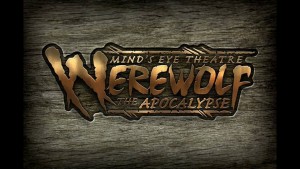Storytelling is hard.
The purpose of this article is to both communicate my personal storytelling style and refine it. I want to explore, with you, how I want to do things and why I should be doing them. I hope that you can find something in them that helps you too. I know that talking to, and roleplaying with, others over the years has helped to improve my storytelling and roleplaying. These will be written from the perspective of a World of Darkness larper, but many of these ideas should apply to other tabletop and larp games.
I want to talk about the difficulty in storytelling to the back and the front of the room. In theater it is important that the play read not just to the close seats, but to all the way in the back row. The actors must not only be able to be heard, but must emote in a way that everyone can understand. There are many ways that theater accomplishes this. Everything from the shape of the stage, to the costumes and props are meant to tell a story to the whole theater. We have to do the same things when running game. We have to reach the back of the room.

For my purposes I divide players into four different categories. Many players will fall into more than one and will change over times. These are not meant to be groundbreaking or all inclusive, but I find them convenient. These categories are indicative of how players find their fun in a game.
Storytellers can address all of these player types by running an inclusive game. Inclusive games are founded with the idea that every player deserves a moment to shine and to have a chance to be part of the story. When writing plots the staff should create situations that have a theme and purpose that fits within the genre of your game and engages character driven by different things. These plots should require a variety of skills to complete or understand them and encourage players to recruit outside of their cliques for help.
Internally Driven

These players self generate personal plots through history and roleplay. They tend to enter play with a goal that they wish to accomplish. That goal can drive inter-character conflict, like the quest to be Prince of a city or it can be driven by NPC interaction, like the drive to gain Pillar Status for your clan. These players enjoy working toward the goals they have set and like to feel as if they could accomplish them.
Seek to support their personal stories by integrating it into the plot of the game as much as you can. Let them climb their mountains, but do not give them easy success. If they succeed, it should be in spite of the trials and difficulties. Ensure that success and setback comes in turn. They want to feel a sense of accomplishment that is worthy of recognition. Give them both hope and the potential for failure.
Externally Driven

These players prefer Storyteller generated plot. They will create their characters with this in mind and will frequently seek to be very good in one or two areas of the game. Some of them will be focused on combat or investigation, but they could just as easily be experts in lore or influence. Players that are driven by plot like to complete missions and solve mysteries in game.
Support these players with interesting and engaging plot. It does not need to be complex to intrigue them, but it does need solid themes and story that fits within the genre of the game that is being run. Give them opportunities to use their skills to move plot along, but write plot that is not simple to bulldoze through. A solid foundation will allow you to improvise along with player action and ideas.
Experience Driven

These players are seeking to have a “Moment”. They want to experience real emotions and drama. Their characters will have great histories and cool costumes and they will use those to pursue scenes where these moments can happen. Experience driven players prefer to stay in character and encourage others to do so as well. They are at game for the roleplay itself.
Storytellers can support them by involving them in divisive and difficult situations. Even if, and sometimes especially if, they have great setbacks and failures these players embrace the roller coaster of feeling. Allow them to play out these situations, but do not allow it to go so far as to detract from the rest of the players. When you are planning games, look for opportunities to include moral and ethical choices. This not only gives them a place to roleplay, but also creates depth for everyone.
Undriven

These players frequently struggling with either the rules, setting, or roleplay in general. They enjoy being involved and spending time with their friends. Sometimes, they are just uninterested in the game, but want to hang out. Everyone falls into this category at times. There are nights when you are too tired or burnt out to really engage plot. It is not always a bad thing. Taking a step back and allowing everyone else to shine can be refreshing for yourself and healthy for the game.
Engaging Undriven characters can be difficult, but the first step is education. When a player looks excluded, pay attention to them. If it is because they do not understand what is going on or how the rules work, then either you, or a designated helper, sit down with them and teach them the basics. Knowing the setting and rules will get them to the point where they know how they can interact, however learning to effectively roleplay helps even more. I like to attach them to an a divisive character or NPC in game. It gives them a goal and something to do. By throwing them in the deep end, they get to become immediately involved. If they still seek to stay on the periphery, give them space. Some players are satisfied with just being at game.
Conclusion
Players are more important than game, characters are more important than plot. Drive everything around creating an experience for your players. This does not mean that you hold back from negative consequences or even character death, just that you ensure they are meaningful. Meaning is the greatest thing you can give to a player’s actions. If you give their failure or death a cool story, they will remember it forever. Do not be afraid of a little boredom or breathing space. This gives players time to relax and characters time to reflect and plot their next move.

Player action and character agency is difficult to deal with at times, but your plot is not as important as player enjoyment and engagement. If the plot is not working or if the players have a better plan, let it go. Allow their solution to work if it makes sense and fits into the game setting. Be willing to script or storyboard scenes that have gotten bogged down or are uninteresting. If a mass combat has reached the point where it is just a series of bland challenges and it is no longer challenging or entertaining, then script the rest of it. Players are willing to negotiate appropriate consequences for a victory, if they feel that is fits with what is happening.
Ultimately, the way to reach every player in your game is to be interested in them. Give everyone, individually, a moment in the spotlight. Take the time to get to know them and to learn why they come to game. Watch yourself when you are writing stories and running NPCs that you do not get too caught up playing to the front. Those players deserve attention, they drive your plots and are usually the social leadership of your game. However, do not forget the back. Those players are at game to enjoy themselves too. Be interested in all the characters in your game and seek to integrate everyone into the larger story.
